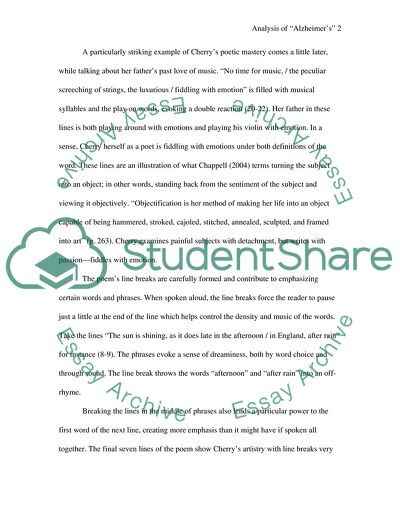
- Home
- Free Samples
- Premium Essays
- Editing Services
- Extra Tools
- Essay Writing Help
- About Us
- Studentshare
- Subjects
- Miscellaneous
- Analysis ofAlzheimer's by Kelly Cherry
Analysis ofAlzheimer's by Kelly Cherry - Essay Example

- Subject: Miscellaneous
- Type: Essay
- Level: Undergraduate
- Pages: 4 (1000 words)
- Downloads: 0
- Author: jschulist
Extract of sample "Analysis ofAlzheimer's by Kelly Cherry"
The poem is not introspective in the usual meaning of the word, though it is extremely personal; Cherry isn’t even in the poem until the last three lines. Cherry does not waste words talking about loss or grief or regret; she allows her images to evoke those emotional states without words. Her use of verbs is phenomenal to evoke emotions in the reader. The images of the flowers and the sun start out as gentle, natural images, but the verbs associated with them personify the natural and twist it into stark relief.
The flowers are slugging it out and clawing at their environment (7); the sun “hardens the house” as though it is beating all the life out of it (10). These images paired with these verbs evoke a sense of desperation in the reader, a sense that the natural has turned on the observer. In some ways the natural has forgotten how to be natural, just as the man’s memories have been forgotten or twisted by Alzheimer’s. By the end of the section, the rosebushes are on fire from the effects of the sun; perhaps also the “crazy old man” is burned to a cinder by the effects of his disease, his memories destroyed (1).
A particularly striking example of Cherry’s poetic mastery comes a little later, while talking about her father’s past love of music. “No time for music, / the peculiar screeching of strings, the luxurious / fiddling with emotion” is filled with musical syllables and the play on words, evoking a double reaction (20-22). Her father in these lines is both playing around with emotions and playing his violin with emotion. In a sense, Cherry herself as a poet is fiddling with emotions under both definitions of the word.
These lines are an illustration of what Chappell (2004) terms turning the subject into an object; in other words, standing back from the sentiment of the subject and viewing it objectively.
...Download file to see next pages Read MoreCHECK THESE SAMPLES OF Analysis ofAlzheimer's by Kelly Cherry
The cherry orchard analysis
Kellys Theory of Personality
George Kelly, Theory of Personal Constructs
The Alzheimer's Disorder
Analysis of Jelly Belly Candy Company
Alzheimer's disease market analysis
Alzheimer's by Kelly Cherry
Analysis of Gail Kelly Case

- TERMS & CONDITIONS
- PRIVACY POLICY
- COOKIES POLICY